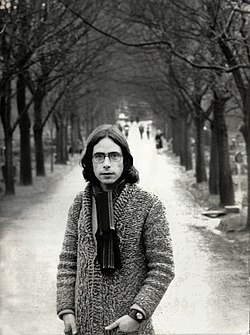Michael Kann
Kann graduated from the Alexander von Humboldt extended secondary school[1] in Berlin-Köpenick, as a skilled heating, ventilation, and air conditioning (HVAC) technician.
However, he had become interested in film and theater, so he joined the Staatliche Schauspielschule Berlin (State drama school, now HfS Ernst Busch,[3] graduating in 1971.
[5] After the Singer-Songwriter Wolf Biermann was stripped of his citizenship by the East Germany (GDR) government, Kann openly criticized the regime.
In the memoir, a Russian woman hid her Jewish husband under the stove for 26 months in the German-occupied Smolensk region and told their children that their father was a rat.
According to Lothar Bisky, the then superintendent of the Academy of Film Art, the regime was worried about the accumulation of Jewish components (i.e., the theme, Erenburg's status, Kann's own family, and a suspected American-Jewish lobby.
Kann was immediately employed as a Dialogue Coach, and as an Assistant Director for Juan Antonio Bardem’s international co-production The Warning (Die Mahnung).
While the official party press almost unanimously disliked the film (Neues Deutschland, Junge Welt, newspapers of the SED district leaderships),[12] there was also supportive press coverage: "The psychology of fascism comes into view",[13] "Stielke can help form characters that we need; form people who interfere in the struggles for humanity..."[14] The film opened on 12 February 1987 on only 15 movie screens, but was seen by about 370,000 (mostly teenage) viewers in the GDR.
[7] For the film, Kann took the original story by the author, gave it a more socially relevance twist, and changed the linear narrative, which led to disputes with Kolditz.
[16] The film was at first negatively received by the Department of the Ministry of Culture, and its premiere was relegated to the "Workers' Festival" in Suhl, the smallest district of the GDR.
Kann's films received approving, even euphoric, press coverage, with praises for his " cheeky, provocative language",[17] which led to box-office success.
